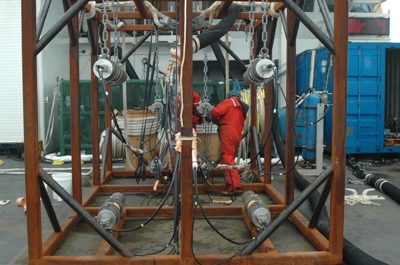( Log In ) Log In is for TREC Teachers & Researchers only
  |
| Steve_Stevenoski |
 Aug 3 2006, 01:00 AM Aug 3 2006, 01:00 AM
Post
#1
|
|
Member   Group: TREC Team Posts: 27 Joined: 19-July 06 Member No.: 39 |
July 30, 2006
I awoke to yet, another wet and nasty morning. We were breaking ice heading to the starting point for a potential first deployment of seismic gear. Matt and Kevin were busy attaching the tube to protect the cables and hoses for the gun onto the deck with eyebolts and shackles. Some final items had to be addressed on the cage, but for the most part things looked pretty good, considering the maze of hoses and tubes that crossed and twisted from one gun to the next. The Executive officer said," all you need is a ramp and some marbles and the cage will be ready." I guess in many ways the cage is like a Rube Goldberg machine at first glance. Final Check of Air Gun  The coring guys were making up some new cables for the big bertha corer. They plan to take a few cores on the ridge in the next day or so. Harm and Matt made a helicopter recon this morning to locate the positions of the instruments that had been deployed yesterday on the ice. They found the first instrument 2 km west of its original position. Now that we have a handle on where the wind and currents are moving the instruments they can plan a course for firing the guns and collecting data. We spent most of the day finishing up little things on the cage. We wrapped old pieces of fire hose around the hoses and cables to prevent chaffing if they rubbed against the cage. All of the bolts were tightened and checked for the third and fourth times. First Deployment  During the late afternoon Paul and Dale were working on the big corer checking. If we were able to do some coring tonight or tomorrow, they would have everything ready to go. Anatoly was painting the tops of the coolers a bright orange to make it easier for them to see from the air. By dinnertime it was obvious that everyone was expecting something to happen with the cage. Harm told me about the early morning flight ops that he went on this morning at dinner. They were able to find instrument 1 relatively easily. Using the antenna onboard the helicopter and a laptop to communicate with the instrument they were able to find the instrument and determine its position. Using its starting position they were able to calculate the rate and direction of drift to locate the other instruments on the ice. They also learned that it was important to have someone communicating directly with the pilot in the front seat. That person should have a GPS unit and act as navigator for the pilot, and direct the search while in the air. By 8:15, we had everything on the cage ready to go. The final step would be to start the compressors and bring the whole system to 2000 PSI. Then he pressure on each gun would individually be increased to 200 PSI. This causes the gun to seal so that no water can get into the gun. Once sealed, all the air is evacuated from the gun and it is ready to use in the water. The last four hours are filled with waiting, journal writing, occasionally giving Max a break from watch, and discussions about future plans. Harm informed me that they have flight ops tentatively planned but actual deployment is weather dependent. The ice in the area is thick enough to support a helicopter, there is not much melt water on the ice, and there is still a thick layer of snow on most of the ice that makes it easy to position the hydrophones. Air Bubble  Larry and Harm would both like to see the seismic operation underway, but they are also concerned that it doesn't make much sense if weather prevents helicopter deployment of the instruments. We will probably give everyone working on the seismic air gun cage a chance to sleep and put the cage in the water in the early morning. The other option would be to head toward the ridge and do some coring. All we can do is wait and see what opportunity the weather and the ice give. |
  |
1 User(s) are reading this topic (1 Guests and 0 Anonymous Users)
0 Members:

|
NSF Acknowledgment & Disclaimer | Time is now: 1st November 2024 - 10:24 AM |
Invision Power Board
v2.1.7 © 2024 IPS, Inc.








